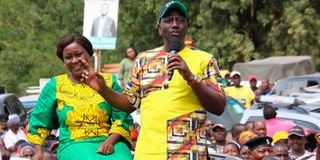Media stakeholders’ promotion of objectivity, fairness in poll laudable

The UDA Embu gubernatorial candidate, Nominated MP Cecily Mbarire, campaigns with the party’s presidential candidate, Deputy President William Ruto, at Karaba Trading Centre in Embu County on May 29.
The stakes have never been higher. With only 34 days to the August 9 general election, political parties and their candidates are not leaving anything to chance. They are unleashing all the tricks and game plans to capture, particularly, the undecided voters while hoping to convince those in the rival side to cross over.
As such, it is now when decency and the law are thrown out of the window in a last-minute rush for the precious vote. Fretful anxious candidates are sure to throw all manner of verbal and physical missiles at rivals to achieve the goal. Sadly, the voter generally appears to have submitted to the situation.
While most candidates face this mean and reprehensible behaviour in the competitive political arena, women, unfortunately, suffer more as they run for office in the male-dominated field. Male political rivals, especially where particularly competition is tight, more often than not find it easier to use uncivilised means to intimidate the female candidate or aspirant off the contest. That comes in the form of personal verbal attacks, which usually also target her family. At its worst, these can turn into physical violence—all with the objective of scaring the women from running against the aggressor or even campaigning.
These sentiments are not far-fetched. A quick peek at social media can confirm. Although the attacks on social media against particular women candidates in next elections are not necessarily propagated by competitors but other opponents. The vitriol is rife, predominant and widespread and rage from ageism to character assassination, falsehood and below-the-belt blows. Women who venture into Kenyan politics have to develop thick skin and do what has to be done to win.
It is not all bleak, however. More female politicians are running for political office than ever—a huge plus for democracy. The forthcoming elections are slated to have an unprecedented number of female candidates.
Record 10 women
The governorship has attracted a record 10 women. They include Nominated MP Cecily Mbarire in Embu, Malindi’s Aisha Jumwa (Kilifi) and Woman Rep Gladys Wanga (Homa Bay), Senator Susan Kihika (Nakuru), former MP Wavinya Ndeti (Machakos), as well as Governor Anne Waiguru and rival Wangui Ngirichi in Kirinyaga. Kwale Governor Salim Mvurya’s deputy Fatuma Achani is seeking to succeed him while Dr Juliet Kimemia and Mwende Gatabaki are running in Kiambu.
Indications are that women governors will exceed the three elected in 2017.
In the Senate bid, although the numbers are still low, there is progress from the last elections, in which four women were elected. At least seven women are running for senator: Senators Fatuma Dullo (Isiolo) and Agnes Kavindu (Machakos) and former Nyeri Woman Rep and ex- National Gender and Equality Commission commissioner Priscilla Nyokabi. Kajiado has Nominated Senator Judith Pareno, in Nakuru brewer Tabitha Karanja and, in Murang’a, former teacher and gospel musician Hellen Kigia Mwangi and ex-PS Lillian Omollo.
The National Assembly race has attracted some 25 women in at least 22 constituencies, more than half of them defending seats.
There has been discernible and constructive determination to get rid of dynamics that impede participation of women in politics, with the objective of ensuring more numbers run for office.
One outstanding effort is empowerment of potential women aspirants and candidates. Empowerment and training of interest groups such as the media is also visible. The Media Council of Kenya (MCK), for instance, has been training journalists in all aspects of election coverage, including gender inclusivity and sensitivity. So far, MCK has conducted more than 2,100 sessions.
Political participation of women in politics is essential for gender equality and unpretentious democracy. It is, therefore, in order to laud such empowerment by MCK and other stakeholders, particularly in the media.
Ms Rugene is consulting editor and founder, The Woman’s Newsroom Foundation. [email protected].





